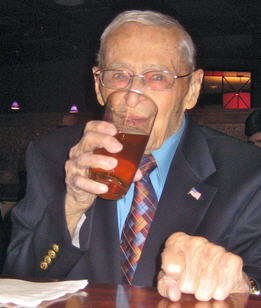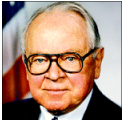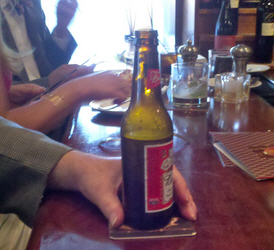Green Eye-Shades
Editor’s Note: You can’t accuse me of recycling this morning. Instead, we are going to go time traveling in an all-new action packed adventure in the wild and exotic world of government Program and Budget. There is so much swirling around these days that it is much easier to just live in the past. Of course, that includes 1968, and I recall not liking it that much. Too much going on and way too over the top. Like now. Not that 1968 didn’t have its moments…
– Vic
Green Eye-Shades

The sun was golden on the patio at Willow, filtered through the abundant greenery of the trees overhead. It was so pleasant a July day that all the tables were occupied and Jasper the bartender was running around in his manic manner, keeping the patrons well lubricated.
Mac was wearing a jacket and tie due to a medical appointment but looked cool but proper. I was wearing a jacket and clip-on bow tie, having strolled over from the office, and was happy we were in the cool darkness of the Willow’s long bar.
“We were talking about the transition from being at DIA in uniform and joining the Intelligence Community Staff as a career civilian. What was that like? I noticed the cultural change immediately when I went to Langley for my last tour in the Navy.”
Mac cleared his throat and reached for his Anchor Steam Beer. He had bullied his doctors into permitting him to have a couple beers, an act for which he was quite proud.
“When I got to Bolling in 1966, I got tagged with the Program and Budget nonsense. DIA had been charged to do build and present to the Congressional Committees a consolidated strategic intelligence budget between Army, Navy, Air Force and their subordinate elements.”
“That was Major Force Program 3, I said. I had to learn about all that crap when they sent me to be the budget staff director at Bolling. The Services still had to do their tactical intelligence- Program 2- submissions through their parent services. Everything else strategic came up through our staff.”
Mac nodded. “Yes. Title 10 and all that. Well, the Congress expected the Director of Central Intelligence to do the same thing for the whole community, and that is one of the reasons Bronson Tweedy had his eye out for me. He thought I knew what I was doing.”
“Apparently they were under the same illusion about me,” I said shaking my head. “It was mind-numbing, and I don’t think I really evr did understand it.” The happy hour white was a pinot grigio, crisp and refreshing. I had a new pen, a Pilot G-2 that made incredibly fine letters on the napkin in front of me.
“It may seem odd nowadays, since the establishment of the office of the Director of National Intelligence, but Congress really only thought the IC Staff was about the budget, not policy. Once I reported to Langley as a civilian, I got involved in the program and budget review work. My account was NSA. They initially considered having me be responsible for the DIA portfolio, but they thought better of it.”
“We called it the General Defense Intelligence Staff when I was at DIA. We found the Community Management Staff- your old IC Staff- to be irritating busybodies.” I glanced down at the bar where Liz-with-an-S was attending to some self-important-looking gentlemen in suits and caught her eye to request a re-fill.
Mac took a sip of beer. “That is the nature of Washington, to be irritating. It was decided that since I had just come from being chief of staff for DIA, that this might be a mistake, since I had just been there doing the budget. Plus, they thought I might not be able to work effectively if I was put in a position of conflict with the Agency where I had been the Number Three. Because of my long-time association with SIGINT and SIGINT activities, they gave me the NSA account.”
“That is where my former Deputy Senior Executive Jerry wound up. He was a holy terror in oversight for the Fort. They feared him. Big job. Lot of money in play.”
“I was extremely comfortable because I had many friends at NSA, and from my time working at Ft Meade in the Naval Intelligence Field Office, knew how their system worked. I was an advocate of many things that NSA was doing, but I also was a critic of what wasn’t going that well. So, I felt good about handling the NSA account.”
“Who got DIA,” I asked. “I had once assembled a list of all the GDIP Staff directors, and posted pictures of the ones I could find in the office in the Pentagon. All got lost in the 9/11 attack. The jet almost hit the staff offices head on. We were lucky the whole staff wasn’t killed like the people in the spaces in the next Wedge.”
“A good day to not be in the Pentagon. A young Air Force vet named Marty Hurwitz got the DIA account,” he said.
“Marty! I actually know him. He must have moved down from Langley to take the job. He was there for, like, 20 years. A real pro, and a good friend to the Commands outside DIA when the Agency didn’t want to play nice.”
“If you want a friend in Washington,” said Mac with a droll smile.
“I know. I ought to go to the pound. I am glad I am not doing that any more.”
“I didn’t really care for that type of work. And even though I enjoyed my new role with the IC staff and my work with NSA, I still never really liked the program and budget cycle and the ridiculously complex process arduous nature of what the U.S. government forces itself through each year.
“It certainly taught me more things I didn’t want to know than any other job I have had.” I rolled my eyes thinking about the tiny interior office in the Pentagon and the endless hours at the desk or in meetings.

Liz-S clearly recognized my distress and topped my glass off. “There there,” she said smoothly. No bad eyeshade people are going to come and take you away.”
“Thankfully I only had the NSA account for two cycle. Even though I did it reasonably well, I never felt comfortable.”
“It was way out of my comfort level, and when you talk to people about the endless racking-and-stacking drills about requirements and available cash to meet them, their eyes cloud over.”
“With good reason. What happened next?”
“Well, in the latter part of 1973 — after Bill Colby became DCI and Sam Wilson became the Director of the IC staff- there was a new problem the community had to deal with, and they needed a go-fer. I kind of became a jack-of-all-trades and a floating representative on the IC Staff, as did Jack Thomas.”

(MG Jack Thomas, USAF-Ret.)
“General Thomas was there when I arrived at Langley twenty years later, I said with a start. The General was an amazing guy, quiet and kind, and he must have had more than a half-century in the business.”
“At least. He was one of the first Air Force general officers who was not a rated pilot. I managed to get out of being a go-fer after a couple years, trying to damp down the mistrust of the IC Staff. People thought we were scheming to undermine the authority of the Agencies. But then something else came up. In 1975, I became a special assistant to Sam Wilson who, in effect, was working with Colby to set up a special project. It is still around and still working. But that is one of the things we agreed not to talk about,” said Mac. “I still have friends up there and they might not approve hearing about it from the Willow.”
Old Jim put down his Budweiser long-neck firmly on the bar at his place at the Amen Corner and growled that he swore he would never disclose a thing, so long as we quit talking about the budget. I think Mac and I were both happy to do that.

Copyright 2017 Vic Socotra
www.vicsocotra.com
